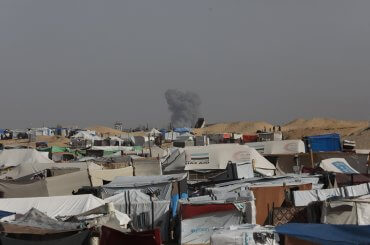Following an international media controversy and intense pressure from Palestinian rights groups, the northern Israeli city of Afula will end its “residents only” ban on its parks.
The decision will take effect on Tuesday July 16, following a court agreement on Sunday, July 14 ordering the Afula municipality to end the ban, which commenced on the first day of summer vacation, July 1st.
Sunday’s court decision came after Palestinian legal rights NGO Adalah, with support from Israel’s district attorney’s office, filed a petition against the city of Afula for discrimination in preventing the entry of Palestinian residents of surrounding areas.
The petition was filed after Adalah attorney Nareman Shehadeh-Zoabi, a Palestinian woman, and her infant son attempted to enter the park but were denied on the basis that they were residents of the nearby city of Nazareth, not Afula.
Following the incident, Adalah released a statement from Zoabi, who said she felt “humiliated” as she watched Jewish residents pass by her, “who freely entered this vast park that I know very well, while I had to trace my steps and return to my car.”
Despite the city’s insistence that its ban was not motivated by racism, two Israeli TV stations conducted separate undercover reports and found that Jewish nonresidents of Afula were being allowed to enter the park even after telling gatekeepers they did not live in the city, the Jerusalem Post reported.
Shortly after court proceedings began on Sunday, Judge Danny Sarfati told the court that he found no reason to even support a debate around the motivations behind the ban, because the municipality has no authority under the law to close public spaces.
Haaretz quoted Sarfati as saying:
“Even if the place is closed only to discriminate [in favor of] local residents, according to the law, charging a fee for public parks is illegal. The ban on charging a fee is a ban on restricting entry. Just as you wouldn’t close a street, you don’t close a park, even without considering whether something is discrimination.”
The judge then told representatives of Afula to willingly sign an agreement to reopen the park to everyone, or the court would order them to do so.
Palestinian MK Ayman Odeh praised the outcome of Sunday’s court hearing, calling it a“victory over racial segregation in Afula,” and that it reminded him of “Martin Luther King’s wonderful statement: ‘Freedom was never voluntarily given by the oppressor’,” the Jerusalem Post reported.
After court was let out, Afula municipality’s lawyer Avi Goldhammer told the AFP that he was “glad that the argument about racism didn’t work,” referring to the judge’s refusal to debate the motivations behind the ban.
But in a legal opinion published on Thursday on the issue, Israel’s Attorney General Avichai Mandelblit stated his position that access to municipal parks “cannot be based on considerations of race” gender, sexual orientation, etc.
The decision by the Attorney General to get involved in the case against Afula and state his position was a “rare occurrence,” an Adalah rep told Mondoweiss.
In a similar situation last year, the Afula municipality enforced a four-day closure of its parks to nonresidents during the Hanukkah holidays.
Adalah sent a letter to the mayor demanding that Afula municipality reopen the park, arguing that they did not have the authority to take such action.
In conjunction with last year’s first park ban, city officials in Afula drew widespread criticism from Adalah and other groups after they took a public oath to “preserve the city’s Jewish character,” just a few months after the controversial Nation-State law was passed.
Prior to that, Afula Mayor Avi Elkabetz made comments that “the occupation of the park must stop,” and that “Israeli flags should be waived and music should be played in Hebrew.”
Last month, Elkabetz joined his deputy mayor and other city council members in a protest against the sale of a home in the area to a Palestinian family — it was not the first time the mayor protested the sale of housing to Arabs.
Following the Nakba in 1948, the Palestinians that remained in their homes in what was to become Israel were eventually given citizenship. Today, they number around 1.2 million, and make up about 21 percent of the population.
While they hold Israeli citizenship, Palestinians in Israel regularly complain of discrimination in public spaces, the workplace, and education, among others.
According to the Institute for Middle East Understanding (IMEU), more than 50 laws exist in Israel “that discriminate against Palestinian citizens of Israel directly or indirectly, based solely on their ethnicity, rendering them second or third class citizens in their own homeland.



→ After court was let out, Afula municipality’s lawyer Avi Goldhammer told the AFP that he was “glad that the argument about racism didn’t work,” referring to the judge’s refusal to debate the motivations behind the ban.
What? The judge did not even hear that argument: he ruled right up front that the municipality lacked the authority to close a public space for whatsoever reason, so the reasons for the illegal closure were irrelevant.
Similar stunts have been pulled time and time again in an ill-fated attempt to pass brazen bigotry and oppression off as equality. Within living memory, registering to vote in much of the US required a test of literacy or of legal knowledge. White people, however, usually were not subjected to testing, whereas Black people had to answer questions to the satisfaction of the invariably white public servant (who typically had no qualifications in any relevant field).
Similarly, the «white Australia» policy, which continued into the 1970s, long provided that any immigrant had to demonstrate suitability by copying a text dictated in any European language—and policy specified that the language be one that the immigrant could be expected not to know. Anglos and various others were routinely exempted from testing, of course—unless they happened to be communist, in which case they’d be given the test repeatedly in various European languages until they inevitably failed it.
Strange. This post has been up for hours and none of the resident Zionists has posted that this case proves that the Zionist entity is under the rule of law with Ayrabs equal to Herrenvolk citizens.
Zionists like to point to the absence, or supposed absence, of petty apartheid rules like separate drinking fountains, to show that Israel isn’t an apartheid state. Maybe that’s what shamed the court into deciding the way it did.
As for white Australia, that’s news to me, and fascinating. I’ll look it up.
I hope these zionist have enough sense to leave palestinians alone to enjoy the park. I hope that all palestinians entering the park have cameras and video at the ready to document the lovely time they have in afula.
How was it under the Nazis…”Keine Juden”.